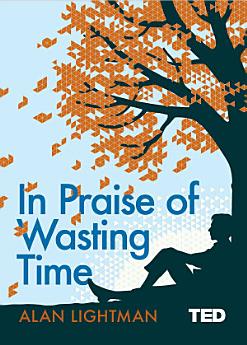In Praise of Wasting Time
ឧសភា 2018 · Simon and Schuster
4.0star
ការវាយតម្លៃ 2report
សៀវភៅអេឡិចត្រូនិច
120
ទំព័រ
family_home
មានសិទ្ធិ
info
reportការវាយតម្លៃ និងមតិវាយតម្លៃមិនត្រូវបានផ្ទៀងផ្ទាត់ទេ ស្វែងយល់បន្ថែម
អំពីសៀវភៅអេឡិចត្រូនិកនេះ
Bestselling author and MIT Professor, Alan Lightman, reveals the benefits of wasting time and allowing our minds to freely roam.
We have apps, smart watches and calendars that constantly remind us to be productive and stop wasting time. We have created a frenzied lifestyle in which time is money, with not a minute to be wasted, and the twenty-four hours of each day are carved up, dissected, and reduced down to small units of efficiency.
Professor Alan Lightman documents the rush and heave of the modern world, and examines the many values of ‘wasting time’ – for replenishing the mind, for creative thought, for finding and solidifying the inner self and letting the mind lie fallow without attempting to accomplish anything and without any assigned tasks.
Carl Jung did his most creative thinking and writing when he took time off from his frenzied practice in Zurich to go to his country house. Gustav Mahler routinely took three or four-hour walks after lunch, stopping to jot down ideas in his notebook. Albert Einstein described letting his mind ‘roam’ to make connections between concepts that were previously unconnected.
In this timely and essential book, Professor Alan Lightman investigates the creativity born from allowing our minds to freely roam. In Praise of Wasting Time teaches us all that sometimes, the best thing to do is to do nothing at all.
We have apps, smart watches and calendars that constantly remind us to be productive and stop wasting time. We have created a frenzied lifestyle in which time is money, with not a minute to be wasted, and the twenty-four hours of each day are carved up, dissected, and reduced down to small units of efficiency.
Professor Alan Lightman documents the rush and heave of the modern world, and examines the many values of ‘wasting time’ – for replenishing the mind, for creative thought, for finding and solidifying the inner self and letting the mind lie fallow without attempting to accomplish anything and without any assigned tasks.
Carl Jung did his most creative thinking and writing when he took time off from his frenzied practice in Zurich to go to his country house. Gustav Mahler routinely took three or four-hour walks after lunch, stopping to jot down ideas in his notebook. Albert Einstein described letting his mind ‘roam’ to make connections between concepts that were previously unconnected.
In this timely and essential book, Professor Alan Lightman investigates the creativity born from allowing our minds to freely roam. In Praise of Wasting Time teaches us all that sometimes, the best thing to do is to do nothing at all.
ការដាក់ផ្កាយ និងមតិវាយតម្លៃ
4.0
ការវាយតម្លៃ 2
អំពីអ្នកនិពន្ធ
Alan Lightman is a physicist, novelist, and essayist. He was educated at Princeton University and at the California Institute of Technology, where he received a PhD in theoretical physics. Lightman is the author of five novels, including the international bestseller Einstein’s Dreams, two collections of essays, a book-length narrative poem, and several books on science. His writing has appeared in The Atlantic, Granta, The New Yorker, and The New York Review of Books, among other publications.
វាយតម្លៃសៀវភៅអេឡិចត្រូនិកនេះ
ប្រាប់យើងអំពីការយល់ឃើញរបស់អ្នក។
អានព័ត៌មាន
ទូរសព្ទឆ្លាតវៃ និងថេប្លេត
ដំឡើងកម្មវិធី Google Play Books សម្រាប់ Android និង iPad/iPhone ។ វាធ្វើសមកាលកម្មដោយស្វ័យប្រវត្តិជាមួយគណនីរបស់អ្នក និងអនុញ្ញាតឱ្យអ្នកអានពេលមានអ៊ីនធឺណិត ឬគ្មានអ៊ីនធឺណិតនៅគ្រប់ទីកន្លែង។
កុំព្យូទ័រយួរដៃ និងកុំព្យូទ័រ
អ្នកអាចស្ដាប់សៀវភៅជាសំឡេងដែលបានទិញនៅក្នុង Google Play ដោយប្រើកម្មវិធីរុករកតាមអ៊ីនធឺណិតក្នុងកុំព្យូទ័ររបស់អ្នក។
eReaders និងឧបករណ៍ផ្សេងទៀត
ដើម្បីអាននៅលើឧបករណ៍ e-ink ដូចជាឧបករណ៍អានសៀវភៅអេឡិចត្រូនិក Kobo អ្នកនឹងត្រូវទាញយកឯកសារ ហើយផ្ទេរវាទៅឧបករណ៍របស់អ្នក។ សូមអនុវត្តតាមការណែនាំលម្អិតរបស់មជ្ឈមណ្ឌលជំនួយ ដើម្បីផ្ទេរឯកសារទៅឧបករណ៍អានសៀវភៅអេឡិចត្រូនិកដែលស្គាល់។








